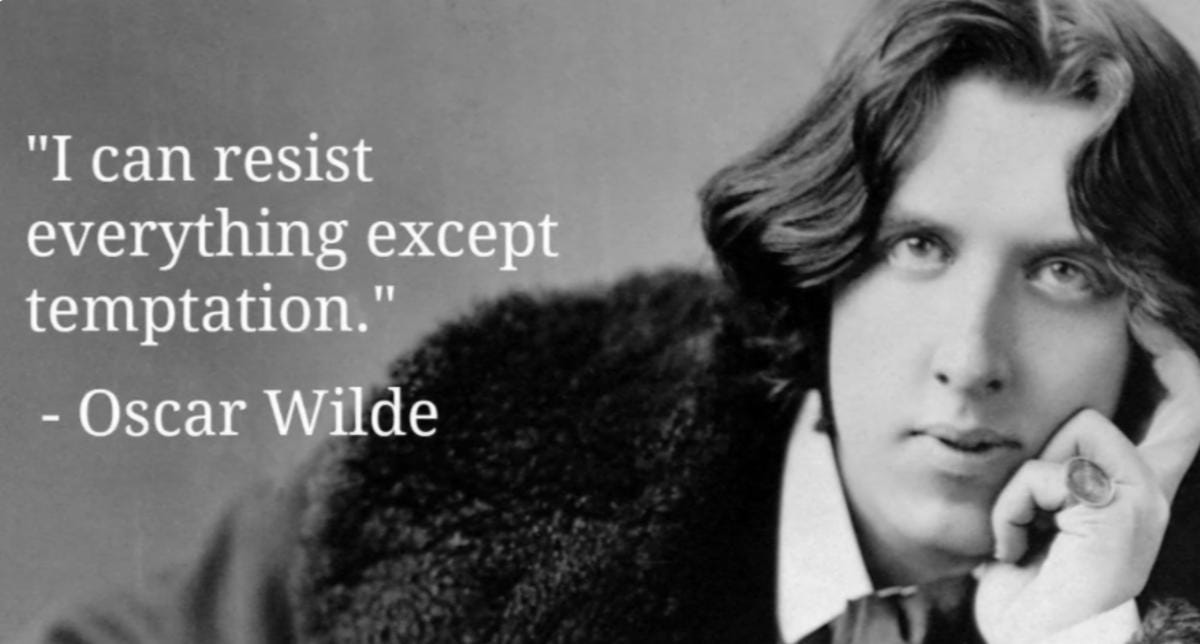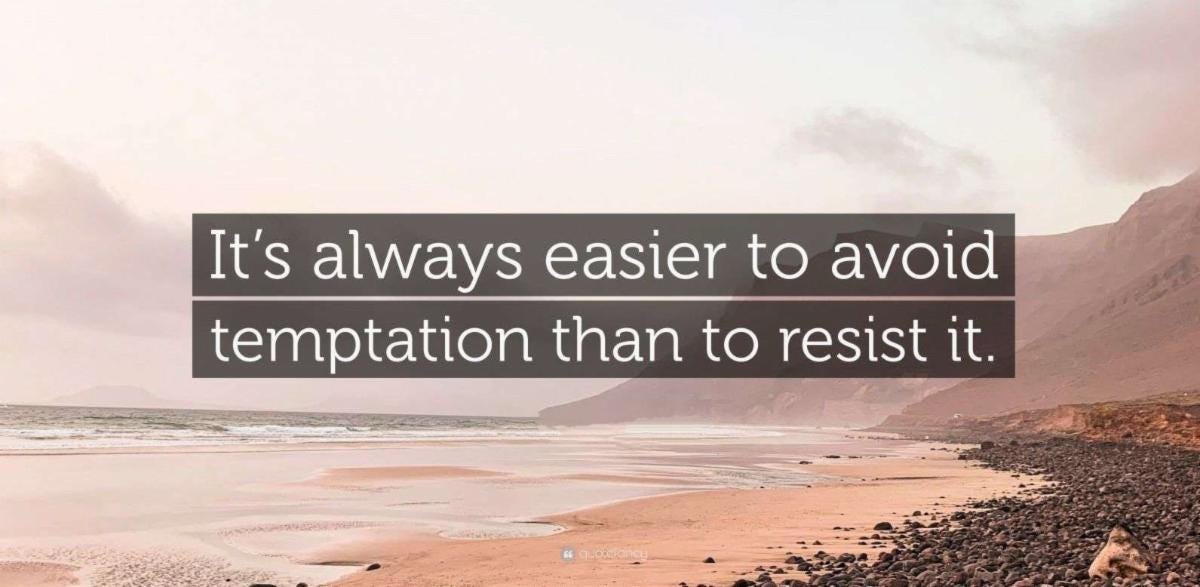If you’ve ever promised yourself, “I’ll just have one of these Girl Scout cookies,” and then regained consciousness surrounded by crumbs and regret and empty sleeves of Thin Mints — this is for you.
If you’ve ever said, “I’ll just even out the top of this ice cream,” and then found your spoon scraping the bottom of your Ben & Jerry’s — you’re in the right place.
If you’ve ever resolved to “only check my email,” and then somehow ended up three hours later circling the doomscrolling drain — read on.
Because your problem might not be your willpower or weakness. It might be your environment.
The Willpower Myth
We often think of self-control as a moral muscle. The more we flex our willpower, the stronger we become. But that idea — noble as it sounds — is mostly wrong. It’s a myth.
Because willpower is really just a form of mental energy. And it often runs out, stranding us on the road halfway to our destination in a place we don’t want to be: temptation.
So while we’re resisting the cookies, ice cream, and doomscrolling — maybe even resisting yelling at the other drivers careening down Temptation Highway in their own willpower-mobiles — by the end of the day, our brains are running on fumes. That’s when we park it and say things like “I deserve this” and suddenly find ourselves watching reality TV while eating cereal straight from the box.
The Smarter Strategy: Avoid, Don’t Resist
Resisting usually doesn’t work. Research shows that lasting change doesn’t come from gutting out or white-knuckling temptation. Because it just keeps coming around again.
What does work is reshaping your environment so you’re less likely to meet temptation in the first place. The people with the strongest self-control aren’t better than you at resisting the bait; they’re just better at avoiding it.
That’s the essence of James Clear’s Atomic Habits, a book that’s become something of a modern behavioral manifesto. Design your surroundings so that good choices are easy to make and bad ones are hard — or at least inconvenient. For example:
Want to eat healthier? Don’t keep junk food in your house. Stock veggies instead.
Want to read more? Put a book by your bed instead of your phone.
Want to spend less? Unsubscribe from those “FLASH SALE!” emails that make you think your happiness depends on new throw pillows.
These aren’t hacks. They’re common-sense helps — tiny bits of planning that save you from your future self, the one who would otherwise be swayed by snacks, screens, and the promise of 40% off something you didn’t know you needed. Engineer your environment now, so that later you can appear to have willpower without actually needing any at all.
Systems Beat Goals
“You don’t rise to the level of your goals,” Clear writes. “You fall to the level of your systems.”
So true. Most of us set lofty goals — lose weight, spend less, drink less, scroll less — and expect willpower to bridge the gap between intention and action.
But goals only describe outcomes. It’s systems that define the processes that make those outcomes possible. Systems catch you when you fall. And, best of all, they run on autopilot.
So set up systems to remove friction between yourself and good habits. Set up systems to add friction between yourself and bad behaviors. When you do, you minimize negotiations between the voices in your head and free up mental space. And then behavior slowly shifts. Not because you’re stronger than you were before, but because the path of least resistance now leads in the right direction.
Identity Is the Engine of Change
Clear also says that habits grow out of identity. If you consistently act like a healthy person, you start to identify as one. And once that identity takes hold, habits follow automatically.
So instead of saying, “I’m trying to quit smoking,” say, “I’m not a smoker.” Instead of “I’m trying to eat better,” say, “I’m the kind of person who eats healthy.” Instead of “I’m trying to respect myself,” say, “I’m a person worthy of respect and all that implies.”
That single shift — from effort to identity — changes everything. Because you’re no longer forcing yourself to do the right thing, you’re becoming a person who embodies the right thing.
How to Outsmart (and Help) Yourself
Whether your challenge is snacking, scrolling, or something more serious, here are a few concrete systemic changes to consider:
Make bad habits invisible. Hide harmful triggers out of sight, out of reach, out of mind.
Make good habits obvious. Put healthy triggers in your path — runners by the door, water on your desk, book on your pillow, veggies in the fridge.
Make bad habits hard. Add friction. Delete the app. Change the password. Dump the snacks. Unsave the credit card. Unplug the TV.
Make good habits easy. Reduce friction. Simplify routines. Prep meals. Schedule workouts. Automate savings. Stay connected to supportive people.
Connect habits to identity. Every time you act in line with your goals, say, “This is me.” Every small win reinforces who you are becoming and believe yourself to be. Over time, it becomes your truth.
Remember, you’re not resisting here, you’re just avoiding what’s harmful. Your brain knows the difference and responds far better to constructive systems than destructive self-flagellation.
When You Need More Than Strategy
Finally, even the best systems are sometimes not enough. Addiction, compulsion, and certain forms of anxiety are not just psychological skirmishes — they’re neurological wars. They’re brain chemistry run amok.
If that’s your reality, reach out for help. Therapy, support groups, and healthy social structures are forms of environment design, too. They change your context, your cues, and your outcomes.
And there’s no shame in needing that kind of help. In fact, it’s the most powerful form of self-control there is: the willingness to re-engineer your world so that healing habits become your default.
The Bottom Line
You don’t have to be stronger than temptation. You just have to avoid it.
Start by redesigning your environment.
Build small, atomic habits that reinforce who you want to become.
And when life gets wobbly, remember that self-control isn’t about moral strength — it’s about systems, identity, and compassion for yourself and your very human brain.
What are you waiting for?
REFLECT:
What’s one temptation I keep trying to resist, and how could I redesign my environment so I don’t have to?
Where in my daily routine am I relying on willpower instead of systems, and what small change could make the better choice automatic?
What kind of person do I want to be, and what habits or systems would make that identity more authentic?











